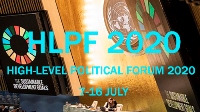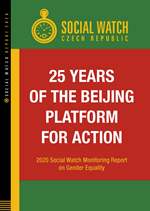Social Watch news
Published on Fri, 2020-07-03 16:07
The 2020 High Level Political Forum (HLPF) will take place from 7 to 16 July. The event, which typically takes place at UN Headquarters in New York City, will now take place in an entirely virtual format, with some official sessions being live-streamed here and other unofficial or side events taking place as webinars on Zoom, WebEx and other videoconferencing platforms. |
Published on Wed, 2020-07-01 18:03
During a publicly live-streamed dialogue with former Brazilian President Lula da Silva last Friday, Argentinian president Alberto Fernandez said he misses the regional solidarity that Latin America had when he was Chief of Cabinet of President Nestor Kirchner back in 2003. "Now it's only Andres Manuel [Lopez Obrador] in Mexico and me" he explained, after Lula's description of the close ties he had as president with many other heads of State in the region and how they dared to say "no" to US president George W. Bush's proposal of a Free Trade Area of the Americas in 2005. |
Published on Thu, 2020-06-25 12:35
Preparations are underway for the 2020 High-level Political Forum (HLPF) and review of the Sustainable Development Goals (SDGs). Member States are engaged in negotiations to adopt by consensus a Political Declaration and 47 have undertaken Voluntary National Reviews (VNRs) for presentation at the HLPF. The UN system has issued a number of reports containing analyses and assessments of progress towards the SDGs. In addition to contributing to these processes and reports, major groups have issued a range of analyses and demands. |
Published on Thu, 2020-06-18 11:09
The impact of the coronavirus pandemic on the global sustainability agendaThe COVID-19 pandemic and the policies with which governments have responded to it have had a serious impact on the global sustainability agenda. While the full extent of the pandemic and its impacts cannot yet be assessed, there is an evident risk that the pandemic will jeopardize the achievement of the internationally agreed Sustainable Development Goals (SDGs) in their entirety. |
Published on Thu, 2020-06-18 00:00
This year marks the 25th anniversary of the Fourth World Conference on Women held in 1995 where the Beijing Declaration and Platform for Action were first adopted embodying the goals and recommended actions for improving women‘s access to their rights in 12 key areas. The presented monitoring report of the Czech Social Watch Coalition on Gender Equality focuses in four studies on the following areas of the Beijing Platform for Action: women and poverty, violence against women, women and economic inequality, and women in decision-making positions. |
Published on Mon, 2020-06-15 21:01
The UN has released a three phase plan for re-opening the United Nations, releasing information on what the “new normal” will look like for Member States, UN Staff and other stakeholders. The plan indicates: |
Published on Thu, 2020-06-11 23:21
A new phrase has gained traction in inter-governmental deliberations at the UN in the virtual world ushered in by COVID-19: “All protocols observed”. Many Member States begin their statements with this phrase that replaces the formality of recognizing lists of colleagues and Member States. Additionally, COVID-19 has given momentum to the development of an “omnibus” UN General Assembly resolution titled: Comprehensive and Coordinated Response to the COVID-19 Pandemic. This has the potential to advance initiatives and new approaches and thinking. It also has the potential to overtake, bypass, reverse or replace the outcomes of policy deliberations separately negotiated and/or not housed explicitly in the COVID-19 Pandemic track. |
Published on Thu, 2020-06-11 17:34
Love (And Health) In The Time Of Corona: The Evolving Shape Of State, Market And Society Triumvirate, As Seen From Latin America. Week 8 of the series on IMAGINARIES FOR A RESILIENT AND INCLUSIVE NEW WORLD, organized by the ENvironment Support Group of India |
Published on Thu, 2020-06-11 13:15
Across the UN System, all hands are on deck to address the impact of COVID-19 from immediate humanitarian and health needs, to medium and longer-term socio-economic policy. Various initiatives are circling one another, raising issues of governance, reporting and accountability. Member States in the ECOSOC Operational Activities Segment explored some of these questions as they related to the UN Development System (UNDS), while in the 28 May and 2 June meetings on Financing for Development they also explored policy ideas, with an emphasis on accounting for vulnerability in macroeconomic analysis. |
Published on Tue, 2020-06-09 12:07
This year marks the 75th anniversary of the United Nations. Secretary-General, António Guterres, has initiated a "global conversation" on the future of the UN. The ongoing pandemic of Covid-19 has made physical meetings impossible and overwhelms us all with new responsibilities and demands in the face of its enormous health, social and economic impact. In this difficult context, a document was submitted to the UN as the result of a dialogue of "the Americas". Concerned that this is the only view from our region reaching the UN, and worried about the very biased opinions it contains, which undervalue the role of women and social movements, among other questionable recommendations, such as the promotion of a closer alliance between the Un and the OAS, a joint letter was sent to the UN, ECLAC, CARICOM, GRULAC and the co-sponsors of the document. |
SUSCRIBE TO OUR NEWSLETTER









